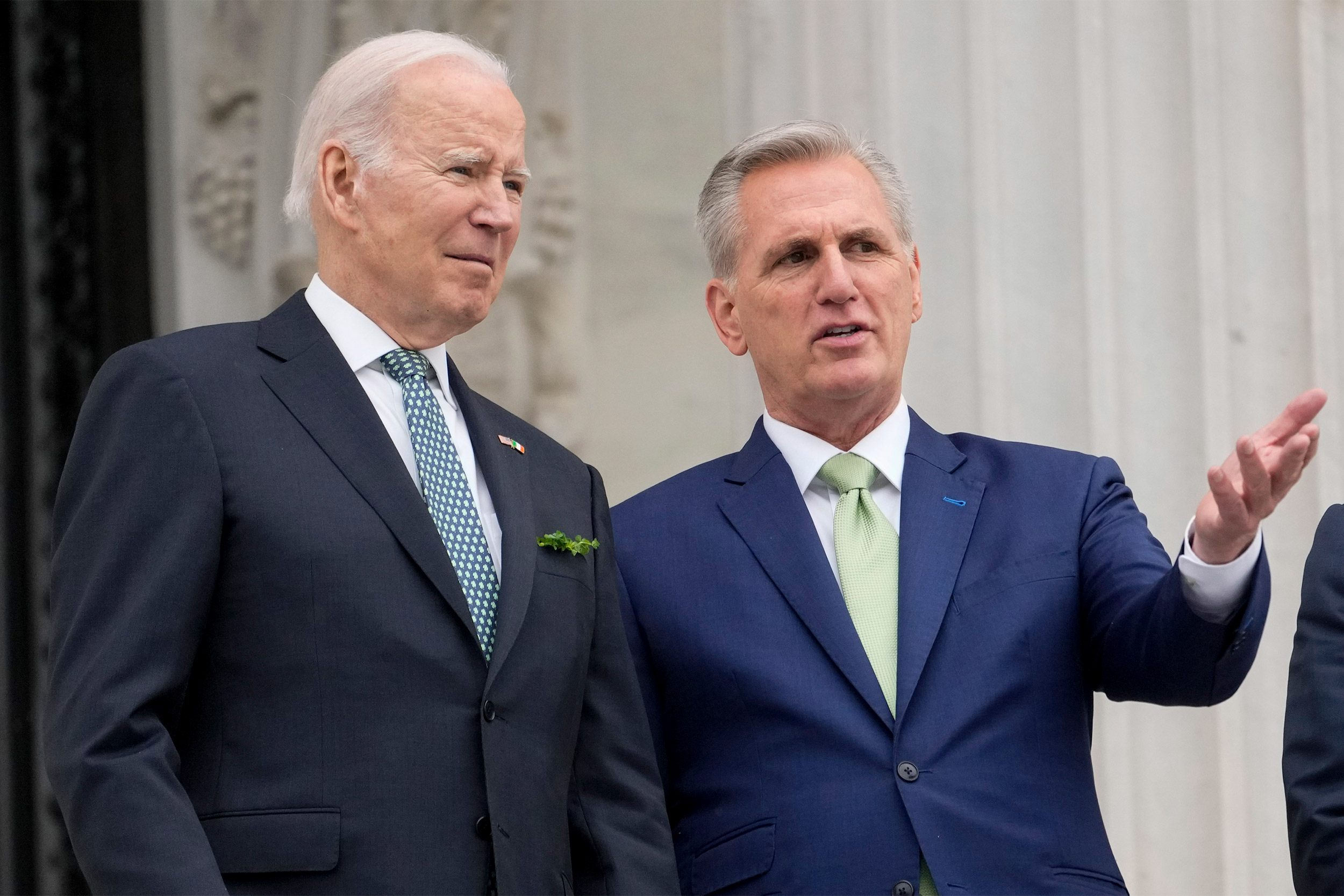
President Joe Biden and House Speaker Kevin McCarthy remain far apart on the debt limit. To avoid default, Laurence Tribe looks at the 14th Amendment as an option.
AP Photo/Alex Brandon, File
How 14th Amendment can help Biden avoid default
Laurence Tribe says in requiring president to pay U.S. debts it supersedes debt-limit law, breaks impasse over GOP demands
U.S. Treasury Secretary Janet Yellen has warned Congress and President Biden they have only until June 1 to reach a deal to raise the nation’s $31.4 trillion borrowing limit or face a default, which would seriously damage the U.S. economy. Republicans are demanding steep budget cuts to many social, healthcare and climate programs in exchange for their agreement to raise the debt limit, a tradeoff Democrats and Biden have rejected.
With time running out and a deal nowhere in sight, some have advised Biden to use his constitutional authority to direct the U.S. Treasury to find a way to pay the nation’s debts even if it exceeds the statutory limit. One strategy Biden said he’s considering is a controversial move advocated by Laurence H. Tribe and some other legal scholars.
Tribe, Carl M. Loeb University Professor of Constitutional Law emeritus at Harvard Law School, argues the 14th Amendment requires Biden to pay all authorized debts, an obligation that supersedes any debt limit statute. Tribe spoke to the Gazette about this legal theory and how it could provide Biden a solution to avoid default. The interview has been edited for clarity and length.
Q&A
Laurence Tribe
GAZETTE: What does the 14th Amendment say about the nation’s debt?
TRIBE: The text of the 14th Amendment is explicit. Section 4 of the 14th Amendment says, “The validity of the public debt of the United States, authorized by law, including debts incurred for payment of pensions and bounties for services in suppressing insurrection or rebellion, shall not be questioned.” This is a guarantee that the U.S. will always be good for all its debts, period.
GAZETTE: So how can a law passed by Congress in 1917 establishing a debt ceiling decide which debts are valid and should be paid and which are less valid, and can be put off?
TRIBE: In my view, a debt ceiling law can’t legitimately do that. But there’s a catch. By leaving that law in place and threatening for the first time ever not to raise the ceiling as needed to pay all the debts it has already created, Congress can cause economic crises by pointing to that ceiling and generating panic because nobody can say for sure what would happen when the ceiling is breached.
From 1789 to 1917, Congress incurred debts pursuant to statutory authorizations, levying taxes and also borrowing money from time to time. When Congress authorized an individual bond issue, typically for a stated purpose, the Treasury Department could borrow money pursuant to that authorization.
That cumbersome process was replaced in 1917 with a statute generally described as the debt limit or the borrowing ceiling. It permits the Treasury to issue bonds that would raise revenue that could then be used for any lawful purpose — up to whatever total Congress had previously specified. The statute’s original purpose was to simplify things, not to create a tool that could be used to create uncertainty and chaos.

Throughout this process, both before 1917 and up to the present, Section 4 of the 14th Amendment has hovered in the background, promising the world that the U.S. could always be counted on to pay its debts in full — as long as those debts had been authorized by law.
Such legal authorizations can take the form of laws empowering the Treasury Department to issue bonds. But legal authorizations for debts incurred by the U.S. can also take the form of laws empowering other federal agencies to administer programs to promote the general welfare or provide for the nation’s defense, like those that fund the military or fund Social Security, Medicare and Medicaid, or the Affordable Care Act.
They also direct the executive branch to incur obligations, most of them to ordinary citizens and not in the form of Treasury bonds or other obligations formally created by the borrowing process that is subject to the statutory borrowing ceiling.
The key point is that the debt limit, or borrowing ceiling, just limits the amount the Treasury may borrow. It doesn’t cancel the obligations that happen to come due when the ceiling is reached.
Once Congress has authorized the executive branch to spend money, directed where and how it is to be spent, and appropriated the money, there’s no question, given Section 4 of the 14th Amendment, that the federal government must somehow find or mint the money to pay in full those to whom its promises have been made pursuant to law.
But that legal fact doesn’t suffice all by itself to prevent people from threatening to invoke the ceiling to hold the country hostage because existing law doesn’t provide a clearly available mechanism by which the federal government can meet its obligations once we have hit the debt limit.
GAZETTE: If the 14th Amendment says our debts cannot be questioned and must be paid, is the 1917 debt limit statute potentially unconstitutional?
TRIBE: That’s the argument that’s being made in a lawsuit filed last week by the National Association of Government Employees. About 75,000 federal employees have filed suit in the federal District Court in Boston against Janet Yellen in her official capacity as Treasury secretary and against Joe Biden as president.
They are asking for a declaration that the debt ceiling is unconstitutional and unenforceable, and an injunction against enforcing it because the president and the Treasury secretary have left open the possibility that they might treat the ceiling as requiring them to defer paying some of our debts once the limit has been reached, and that in turn threatens the employees with losing their jobs.
Some critics think the people who brought that suit are claiming more than they need to in order to win. As I wrote in The New York Times a week ago, even if the ceiling itself isn’t unconstitutional, using the ceiling to make us default on our debts clearly would be unconstitutional.
At a time when the ceiling is way higher than the actual accumulated debt, it has no particular negative effect. It simply looms like a future guillotine. If I were a judge presented with this case, I might well hold that, whether or not it’s unconstitutional on its face, it’s unconstitutional as applied in this situation because it serves no rational purpose. It merely provides a hostage-taking device.
GAZETTE: Could the Supreme Court eventually take up this question?
TRIBE: I wouldn’t advise the president to file his own lawsuit. The Supreme Court could ultimately take up the question anyway in the lawsuit filed on behalf of civilian and military federal employees who plausibly allege that their jobs are in jeopardy because the executive branch has left open the possibility that it’ll treat the debt ceiling as binding on it despite the 14th Amendment’s mandate that all the federal government’s debts be paid, and because Congress has threatened not to raise the ceiling unless the president makes concessions that he says he will not make.
GAZETTE: If President Biden takes your advice, wouldn’t there be immediate legal challenges from the House of Representatives and others?
TRIBE: Challenges to the ceiling itself already exist, in the form of the lawsuit already filed in Boston. Challengers who have standing to object not to the ceiling but to government spending after the ceiling has been reached wouldn’t be easy to find. But even supposing someone who could allege injury from legally authorized expenditures could be found, they’d need to figure out what to ask the court to do. They certainly couldn’t ask it to decide, or to order the president to decide, which debts to leave unpaid by essentially vetoing some congressionally authorized programs on a selective basis. That would amount to a line-item veto of the kind the Supreme Court in 1998 held unconstitutional. Presumably the request would be for the court to enjoin further borrowing or further minting of money.
GAZETTE: Could Congress argue that by ignoring the debt ceiling President Biden is usurping its “power of the purse”?
TRIBE: Not easily. He isn’t threatening to spend money that Congress hasn’t authorized and appropriated the way Secretary of Health and Human Services [Sylvia Mathews] Burwell did in 2015 with respect to the Affordable Care Act, leading the House of Representatives to sue her in a case that today would clearly require both the House and the Senate to join as plaintiffs because the Supreme Court in 2019 held, in a case brought by the Virginia House of Delegates, that a single House of a bicameral legislature “lacks capacity to assert interests belonging to the legislature as a whole.”
Obviously, today’s Senate wouldn’t join the House in suing President Biden but, if it would, the claim would have to be not that he’s spending money without congressional authorization but that he’s letting the Treasury Department borrow money Congress hasn’t authorized it to borrow under the power that Article I, Section 8, Clause 2 gives Congress to “borrow Money on the credit of the United States.” And such a suit would put any court in a terrible bind because it would have to choose among options none of which would leave all the laws of the U.S. intact.
Either the laws creating duties to individuals and corporations to whom the U.S. has a debt would be abrogated, in violation of the 14th Amendment, or the law capping what Treasury can borrow would be abrogated, in violation of that one law. A presidential choice to abrogate that one law instead of all the others — and the Constitution to boot — would be hard for any court to overturn.






